Fostering Dignity and Respect: Ethical Concepts in Patient Care
VerifiedAdded on 2023/06/12
|12
|3339
|418
Report
AI Summary
This report discusses the importance of dignity and respect in healthcare, focusing on ethical concepts such as freedom, rights, responsibilities, and the use of power in care. It addresses strategies that healthcare staff can employ to support and respect patient dignity, particularly in the context of Mrs. Martha Jayasekera's case. The report highlights the significance of respecting patient rights, maintaining privacy, and effective communication. It also emphasizes the role of telemedicine advancements and the importance of accurate patient data transmission for collaborative care. The goal is to provide a framework for healthcare professionals to deliver the best possible care with compassion, dignity, and respect, ensuring patient well-being and safety. Desklib offers a wealth of resources including similar solved assignments and study tools for students.
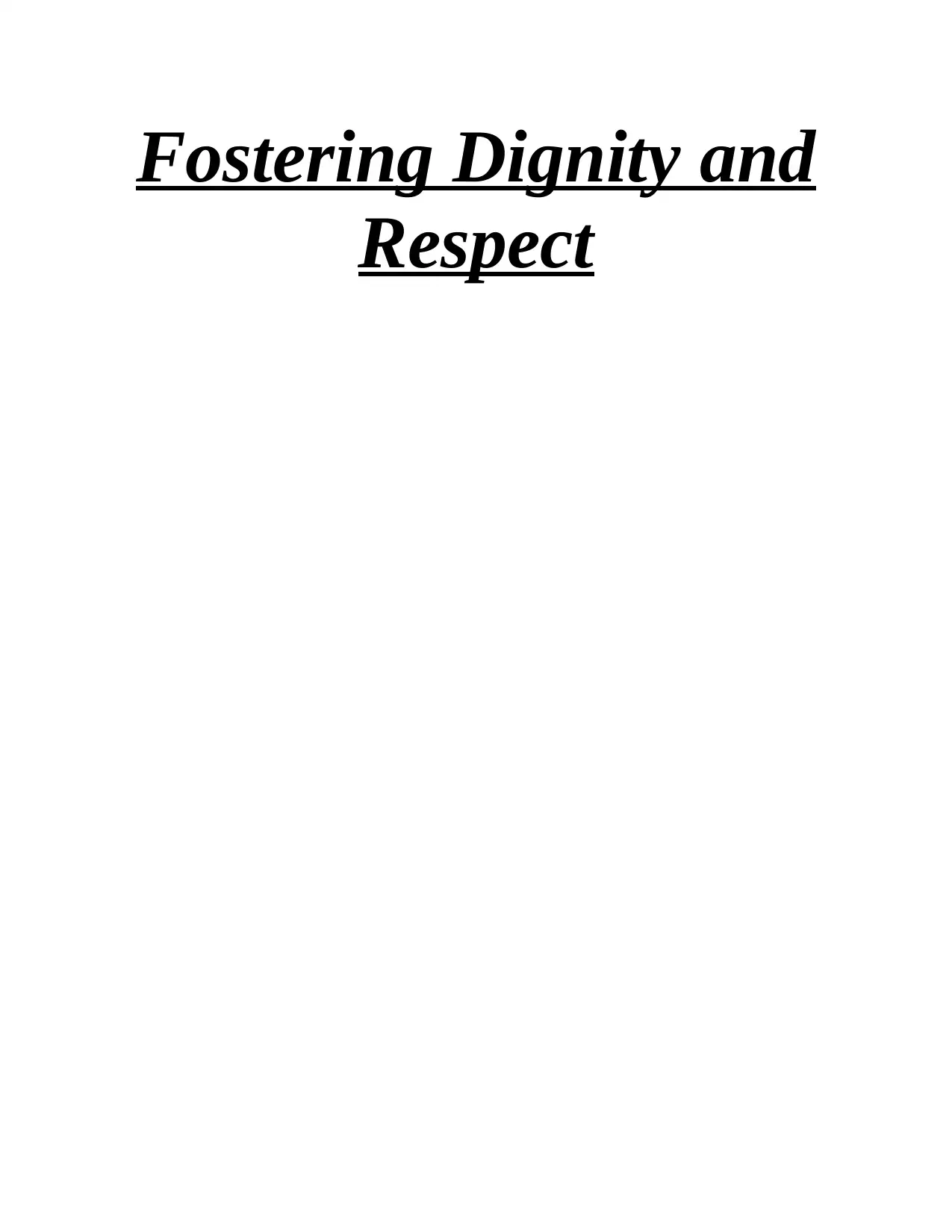
Fostering Dignity and
Respect
Respect
Paraphrase This Document
Need a fresh take? Get an instant paraphrase of this document with our AI Paraphraser
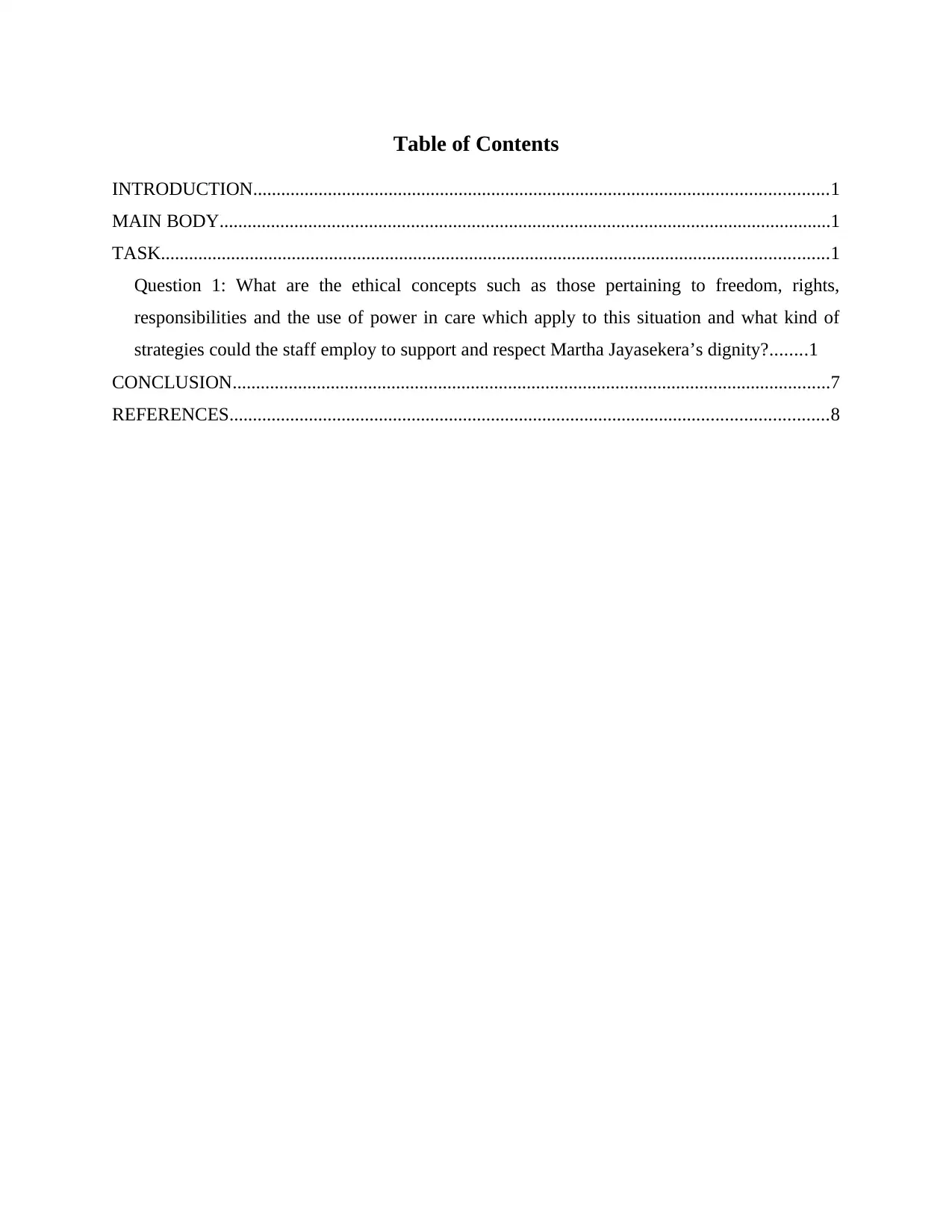
Table of Contents
INTRODUCTION...........................................................................................................................1
MAIN BODY...................................................................................................................................1
TASK...............................................................................................................................................1
Question 1: What are the ethical concepts such as those pertaining to freedom, rights,
responsibilities and the use of power in care which apply to this situation and what kind of
strategies could the staff employ to support and respect Martha Jayasekera’s dignity?........1
CONCLUSION................................................................................................................................7
REFERENCES................................................................................................................................8
INTRODUCTION...........................................................................................................................1
MAIN BODY...................................................................................................................................1
TASK...............................................................................................................................................1
Question 1: What are the ethical concepts such as those pertaining to freedom, rights,
responsibilities and the use of power in care which apply to this situation and what kind of
strategies could the staff employ to support and respect Martha Jayasekera’s dignity?........1
CONCLUSION................................................................................................................................7
REFERENCES................................................................................................................................8
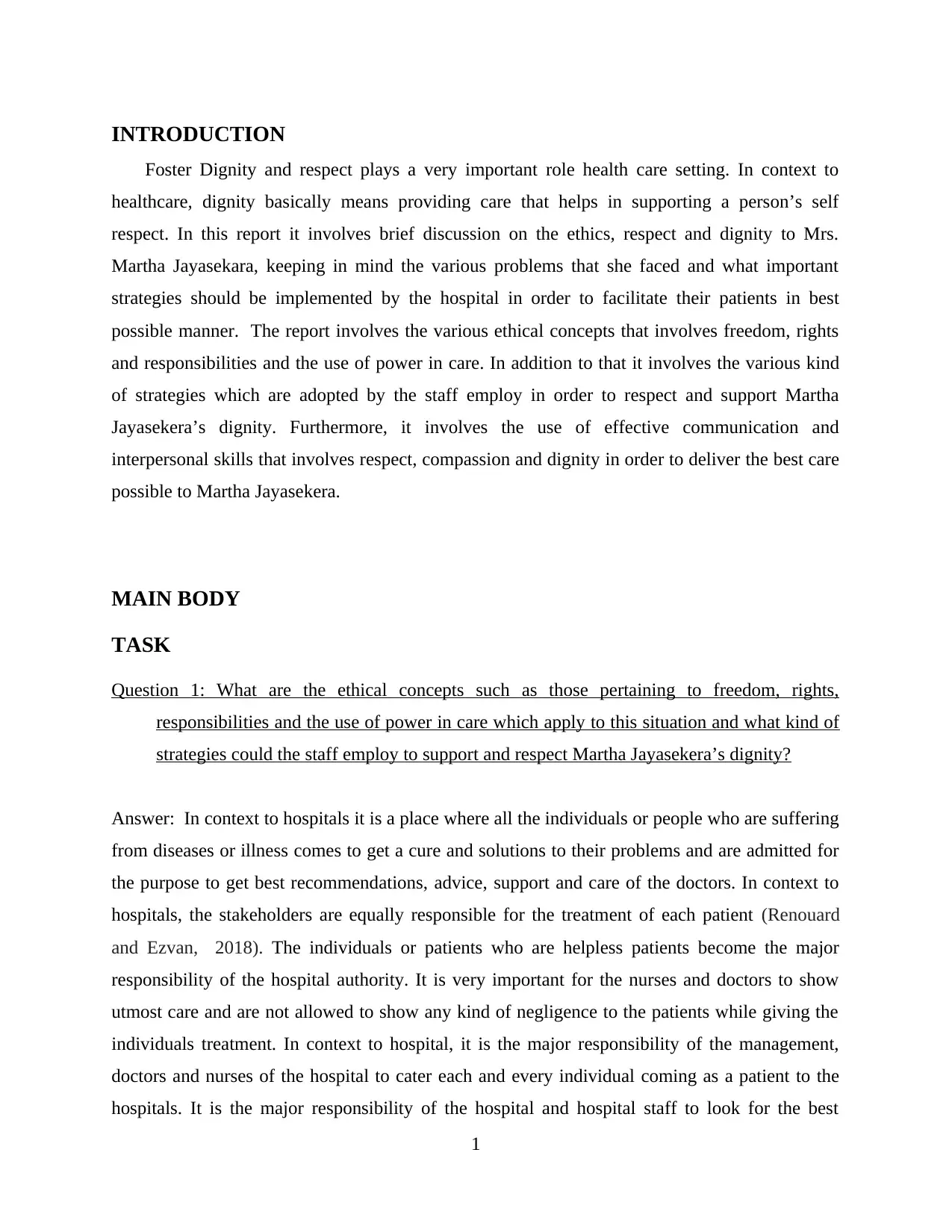
INTRODUCTION
Foster Dignity and respect plays a very important role health care setting. In context to
healthcare, dignity basically means providing care that helps in supporting a person’s self
respect. In this report it involves brief discussion on the ethics, respect and dignity to Mrs.
Martha Jayasekara, keeping in mind the various problems that she faced and what important
strategies should be implemented by the hospital in order to facilitate their patients in best
possible manner. The report involves the various ethical concepts that involves freedom, rights
and responsibilities and the use of power in care. In addition to that it involves the various kind
of strategies which are adopted by the staff employ in order to respect and support Martha
Jayasekera’s dignity. Furthermore, it involves the use of effective communication and
interpersonal skills that involves respect, compassion and dignity in order to deliver the best care
possible to Martha Jayasekera.
MAIN BODY
TASK
Question 1: What are the ethical concepts such as those pertaining to freedom, rights,
responsibilities and the use of power in care which apply to this situation and what kind of
strategies could the staff employ to support and respect Martha Jayasekera’s dignity?
Answer: In context to hospitals it is a place where all the individuals or people who are suffering
from diseases or illness comes to get a cure and solutions to their problems and are admitted for
the purpose to get best recommendations, advice, support and care of the doctors. In context to
hospitals, the stakeholders are equally responsible for the treatment of each patient (Renouard
and Ezvan, 2018). The individuals or patients who are helpless patients become the major
responsibility of the hospital authority. It is very important for the nurses and doctors to show
utmost care and are not allowed to show any kind of negligence to the patients while giving the
individuals treatment. In context to hospital, it is the major responsibility of the management,
doctors and nurses of the hospital to cater each and every individual coming as a patient to the
hospitals. It is the major responsibility of the hospital and hospital staff to look for the best
1
Foster Dignity and respect plays a very important role health care setting. In context to
healthcare, dignity basically means providing care that helps in supporting a person’s self
respect. In this report it involves brief discussion on the ethics, respect and dignity to Mrs.
Martha Jayasekara, keeping in mind the various problems that she faced and what important
strategies should be implemented by the hospital in order to facilitate their patients in best
possible manner. The report involves the various ethical concepts that involves freedom, rights
and responsibilities and the use of power in care. In addition to that it involves the various kind
of strategies which are adopted by the staff employ in order to respect and support Martha
Jayasekera’s dignity. Furthermore, it involves the use of effective communication and
interpersonal skills that involves respect, compassion and dignity in order to deliver the best care
possible to Martha Jayasekera.
MAIN BODY
TASK
Question 1: What are the ethical concepts such as those pertaining to freedom, rights,
responsibilities and the use of power in care which apply to this situation and what kind of
strategies could the staff employ to support and respect Martha Jayasekera’s dignity?
Answer: In context to hospitals it is a place where all the individuals or people who are suffering
from diseases or illness comes to get a cure and solutions to their problems and are admitted for
the purpose to get best recommendations, advice, support and care of the doctors. In context to
hospitals, the stakeholders are equally responsible for the treatment of each patient (Renouard
and Ezvan, 2018). The individuals or patients who are helpless patients become the major
responsibility of the hospital authority. It is very important for the nurses and doctors to show
utmost care and are not allowed to show any kind of negligence to the patients while giving the
individuals treatment. In context to hospital, it is the major responsibility of the management,
doctors and nurses of the hospital to cater each and every individual coming as a patient to the
hospitals. It is the major responsibility of the hospital and hospital staff to look for the best
1
⊘ This is a preview!⊘
Do you want full access?
Subscribe today to unlock all pages.

Trusted by 1+ million students worldwide
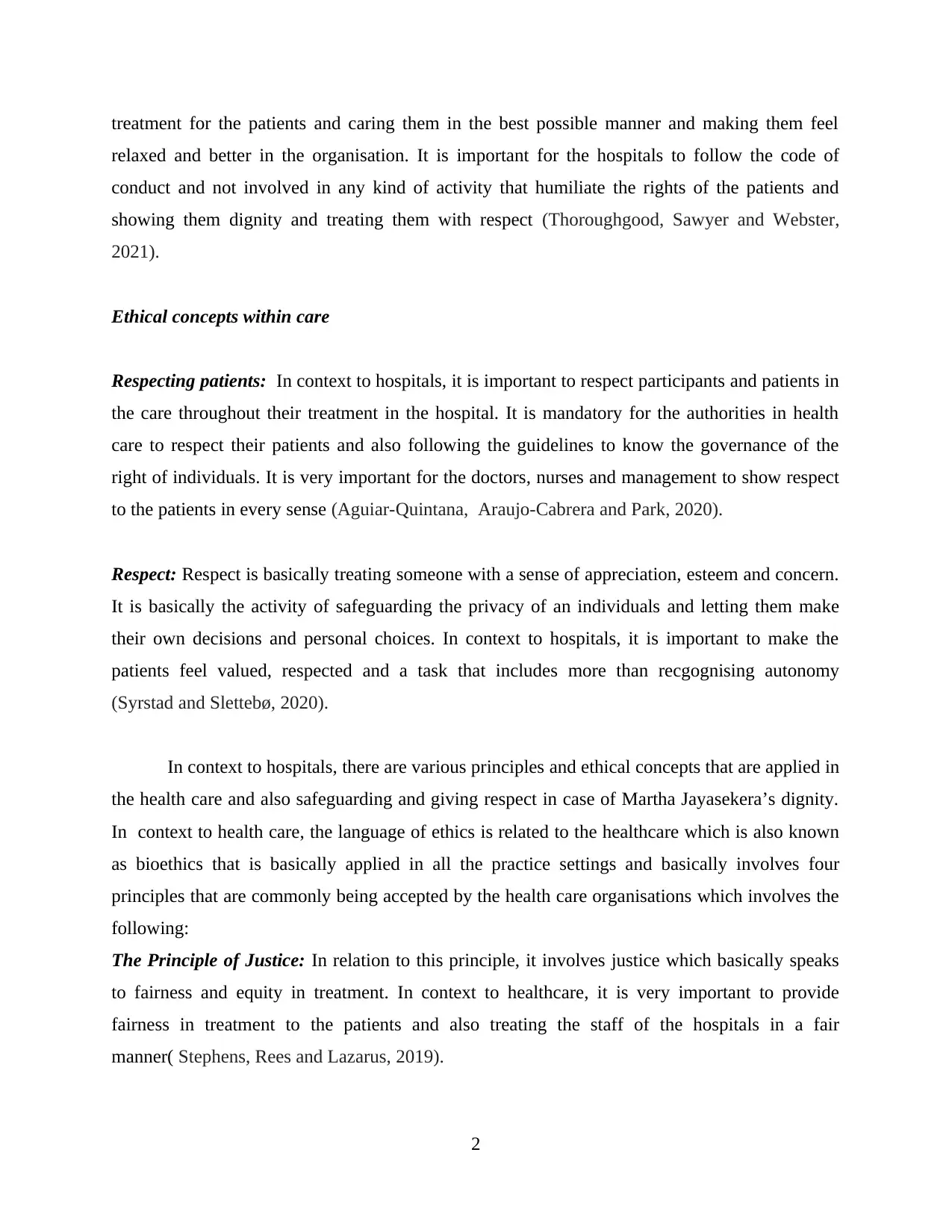
treatment for the patients and caring them in the best possible manner and making them feel
relaxed and better in the organisation. It is important for the hospitals to follow the code of
conduct and not involved in any kind of activity that humiliate the rights of the patients and
showing them dignity and treating them with respect (Thoroughgood, Sawyer and Webster,
2021).
Ethical concepts within care
Respecting patients: In context to hospitals, it is important to respect participants and patients in
the care throughout their treatment in the hospital. It is mandatory for the authorities in health
care to respect their patients and also following the guidelines to know the governance of the
right of individuals. It is very important for the doctors, nurses and management to show respect
to the patients in every sense (Aguiar-Quintana, Araujo-Cabrera and Park, 2020).
Respect: Respect is basically treating someone with a sense of appreciation, esteem and concern.
It is basically the activity of safeguarding the privacy of an individuals and letting them make
their own decisions and personal choices. In context to hospitals, it is important to make the
patients feel valued, respected and a task that includes more than recgognising autonomy
(Syrstad and Slettebø, 2020).
In context to hospitals, there are various principles and ethical concepts that are applied in
the health care and also safeguarding and giving respect in case of Martha Jayasekera’s dignity.
In context to health care, the language of ethics is related to the healthcare which is also known
as bioethics that is basically applied in all the practice settings and basically involves four
principles that are commonly being accepted by the health care organisations which involves the
following:
The Principle of Justice: In relation to this principle, it involves justice which basically speaks
to fairness and equity in treatment. In context to healthcare, it is very important to provide
fairness in treatment to the patients and also treating the staff of the hospitals in a fair
manner( Stephens, Rees and Lazarus, 2019).
2
relaxed and better in the organisation. It is important for the hospitals to follow the code of
conduct and not involved in any kind of activity that humiliate the rights of the patients and
showing them dignity and treating them with respect (Thoroughgood, Sawyer and Webster,
2021).
Ethical concepts within care
Respecting patients: In context to hospitals, it is important to respect participants and patients in
the care throughout their treatment in the hospital. It is mandatory for the authorities in health
care to respect their patients and also following the guidelines to know the governance of the
right of individuals. It is very important for the doctors, nurses and management to show respect
to the patients in every sense (Aguiar-Quintana, Araujo-Cabrera and Park, 2020).
Respect: Respect is basically treating someone with a sense of appreciation, esteem and concern.
It is basically the activity of safeguarding the privacy of an individuals and letting them make
their own decisions and personal choices. In context to hospitals, it is important to make the
patients feel valued, respected and a task that includes more than recgognising autonomy
(Syrstad and Slettebø, 2020).
In context to hospitals, there are various principles and ethical concepts that are applied in
the health care and also safeguarding and giving respect in case of Martha Jayasekera’s dignity.
In context to health care, the language of ethics is related to the healthcare which is also known
as bioethics that is basically applied in all the practice settings and basically involves four
principles that are commonly being accepted by the health care organisations which involves the
following:
The Principle of Justice: In relation to this principle, it involves justice which basically speaks
to fairness and equity in treatment. In context to healthcare, it is very important to provide
fairness in treatment to the patients and also treating the staff of the hospitals in a fair
manner( Stephens, Rees and Lazarus, 2019).
2
Paraphrase This Document
Need a fresh take? Get an instant paraphrase of this document with our AI Paraphraser
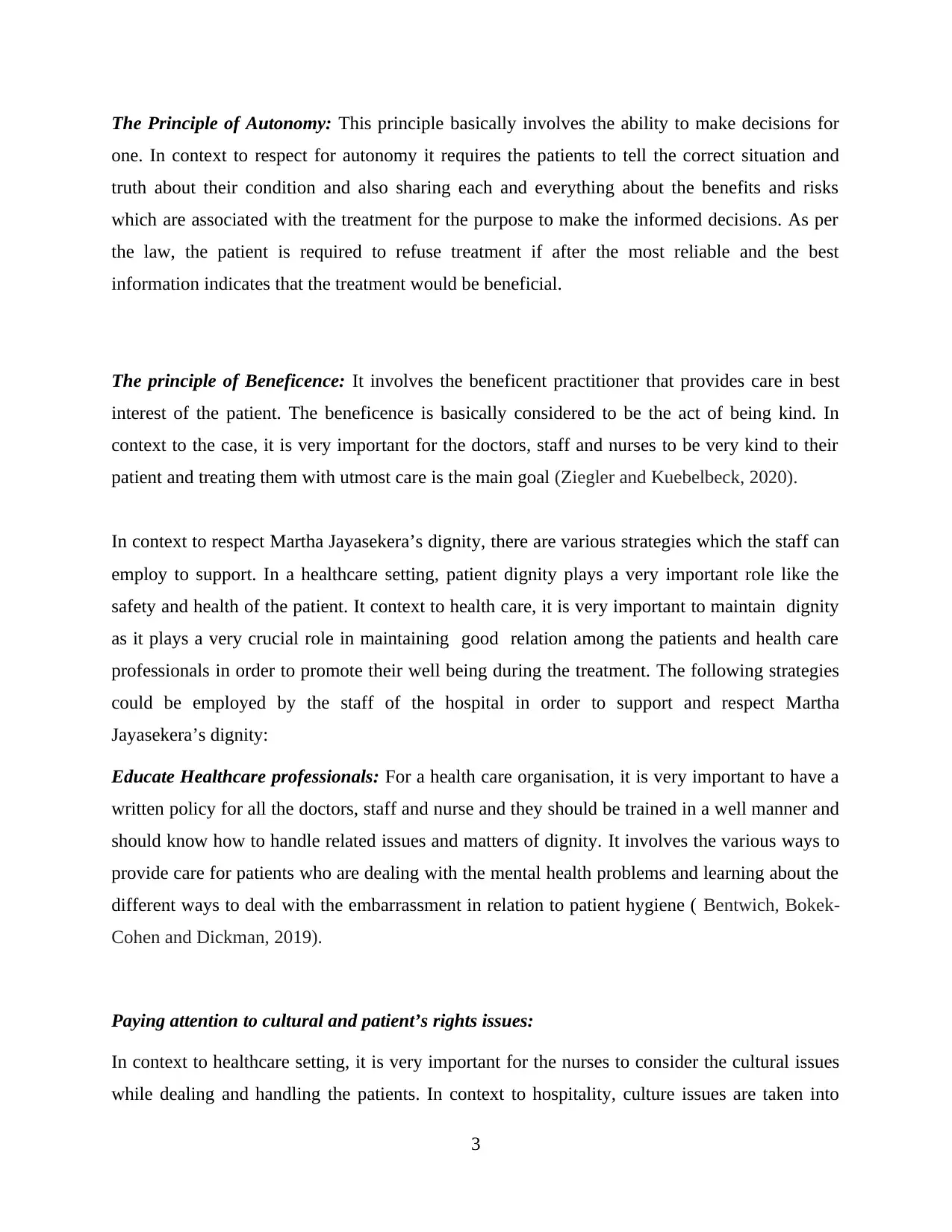
The Principle of Autonomy: This principle basically involves the ability to make decisions for
one. In context to respect for autonomy it requires the patients to tell the correct situation and
truth about their condition and also sharing each and everything about the benefits and risks
which are associated with the treatment for the purpose to make the informed decisions. As per
the law, the patient is required to refuse treatment if after the most reliable and the best
information indicates that the treatment would be beneficial.
The principle of Beneficence: It involves the beneficent practitioner that provides care in best
interest of the patient. The beneficence is basically considered to be the act of being kind. In
context to the case, it is very important for the doctors, staff and nurses to be very kind to their
patient and treating them with utmost care is the main goal (Ziegler and Kuebelbeck, 2020).
In context to respect Martha Jayasekera’s dignity, there are various strategies which the staff can
employ to support. In a healthcare setting, patient dignity plays a very important role like the
safety and health of the patient. It context to health care, it is very important to maintain dignity
as it plays a very crucial role in maintaining good relation among the patients and health care
professionals in order to promote their well being during the treatment. The following strategies
could be employed by the staff of the hospital in order to support and respect Martha
Jayasekera’s dignity:
Educate Healthcare professionals: For a health care organisation, it is very important to have a
written policy for all the doctors, staff and nurse and they should be trained in a well manner and
should know how to handle related issues and matters of dignity. It involves the various ways to
provide care for patients who are dealing with the mental health problems and learning about the
different ways to deal with the embarrassment in relation to patient hygiene ( Bentwich, Bokek-
Cohen and Dickman, 2019).
Paying attention to cultural and patient’s rights issues:
In context to healthcare setting, it is very important for the nurses to consider the cultural issues
while dealing and handling the patients. In context to hospitality, culture issues are taken into
3
one. In context to respect for autonomy it requires the patients to tell the correct situation and
truth about their condition and also sharing each and everything about the benefits and risks
which are associated with the treatment for the purpose to make the informed decisions. As per
the law, the patient is required to refuse treatment if after the most reliable and the best
information indicates that the treatment would be beneficial.
The principle of Beneficence: It involves the beneficent practitioner that provides care in best
interest of the patient. The beneficence is basically considered to be the act of being kind. In
context to the case, it is very important for the doctors, staff and nurses to be very kind to their
patient and treating them with utmost care is the main goal (Ziegler and Kuebelbeck, 2020).
In context to respect Martha Jayasekera’s dignity, there are various strategies which the staff can
employ to support. In a healthcare setting, patient dignity plays a very important role like the
safety and health of the patient. It context to health care, it is very important to maintain dignity
as it plays a very crucial role in maintaining good relation among the patients and health care
professionals in order to promote their well being during the treatment. The following strategies
could be employed by the staff of the hospital in order to support and respect Martha
Jayasekera’s dignity:
Educate Healthcare professionals: For a health care organisation, it is very important to have a
written policy for all the doctors, staff and nurse and they should be trained in a well manner and
should know how to handle related issues and matters of dignity. It involves the various ways to
provide care for patients who are dealing with the mental health problems and learning about the
different ways to deal with the embarrassment in relation to patient hygiene ( Bentwich, Bokek-
Cohen and Dickman, 2019).
Paying attention to cultural and patient’s rights issues:
In context to healthcare setting, it is very important for the nurses to consider the cultural issues
while dealing and handling the patients. In context to hospitality, culture issues are taken into
3
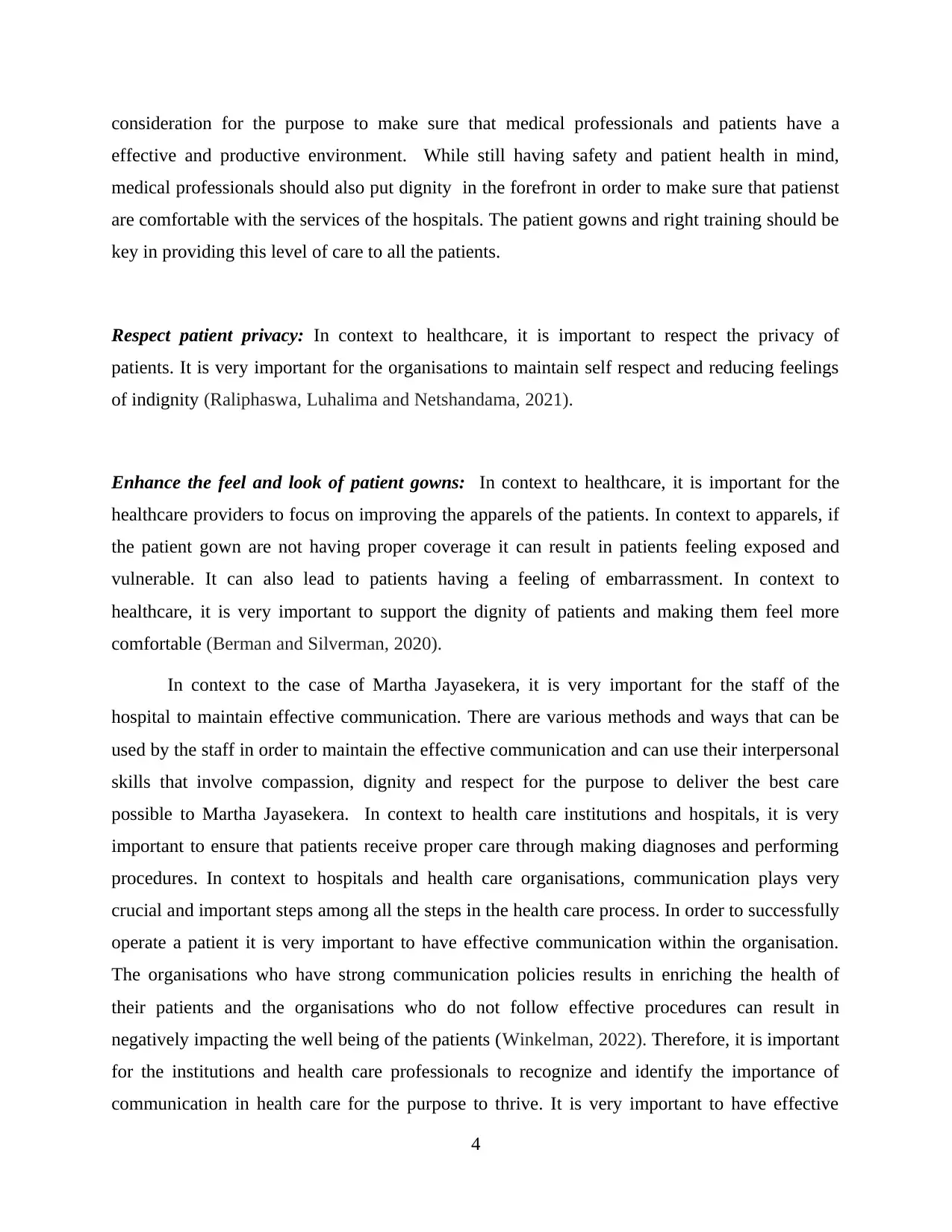
consideration for the purpose to make sure that medical professionals and patients have a
effective and productive environment. While still having safety and patient health in mind,
medical professionals should also put dignity in the forefront in order to make sure that patienst
are comfortable with the services of the hospitals. The patient gowns and right training should be
key in providing this level of care to all the patients.
Respect patient privacy: In context to healthcare, it is important to respect the privacy of
patients. It is very important for the organisations to maintain self respect and reducing feelings
of indignity (Raliphaswa, Luhalima and Netshandama, 2021).
Enhance the feel and look of patient gowns: In context to healthcare, it is important for the
healthcare providers to focus on improving the apparels of the patients. In context to apparels, if
the patient gown are not having proper coverage it can result in patients feeling exposed and
vulnerable. It can also lead to patients having a feeling of embarrassment. In context to
healthcare, it is very important to support the dignity of patients and making them feel more
comfortable (Berman and Silverman, 2020).
In context to the case of Martha Jayasekera, it is very important for the staff of the
hospital to maintain effective communication. There are various methods and ways that can be
used by the staff in order to maintain the effective communication and can use their interpersonal
skills that involve compassion, dignity and respect for the purpose to deliver the best care
possible to Martha Jayasekera. In context to health care institutions and hospitals, it is very
important to ensure that patients receive proper care through making diagnoses and performing
procedures. In context to hospitals and health care organisations, communication plays very
crucial and important steps among all the steps in the health care process. In order to successfully
operate a patient it is very important to have effective communication within the organisation.
The organisations who have strong communication policies results in enriching the health of
their patients and the organisations who do not follow effective procedures can result in
negatively impacting the well being of the patients (Winkelman, 2022). Therefore, it is important
for the institutions and health care professionals to recognize and identify the importance of
communication in health care for the purpose to thrive. It is very important to have effective
4
effective and productive environment. While still having safety and patient health in mind,
medical professionals should also put dignity in the forefront in order to make sure that patienst
are comfortable with the services of the hospitals. The patient gowns and right training should be
key in providing this level of care to all the patients.
Respect patient privacy: In context to healthcare, it is important to respect the privacy of
patients. It is very important for the organisations to maintain self respect and reducing feelings
of indignity (Raliphaswa, Luhalima and Netshandama, 2021).
Enhance the feel and look of patient gowns: In context to healthcare, it is important for the
healthcare providers to focus on improving the apparels of the patients. In context to apparels, if
the patient gown are not having proper coverage it can result in patients feeling exposed and
vulnerable. It can also lead to patients having a feeling of embarrassment. In context to
healthcare, it is very important to support the dignity of patients and making them feel more
comfortable (Berman and Silverman, 2020).
In context to the case of Martha Jayasekera, it is very important for the staff of the
hospital to maintain effective communication. There are various methods and ways that can be
used by the staff in order to maintain the effective communication and can use their interpersonal
skills that involve compassion, dignity and respect for the purpose to deliver the best care
possible to Martha Jayasekera. In context to health care institutions and hospitals, it is very
important to ensure that patients receive proper care through making diagnoses and performing
procedures. In context to hospitals and health care organisations, communication plays very
crucial and important steps among all the steps in the health care process. In order to successfully
operate a patient it is very important to have effective communication within the organisation.
The organisations who have strong communication policies results in enriching the health of
their patients and the organisations who do not follow effective procedures can result in
negatively impacting the well being of the patients (Winkelman, 2022). Therefore, it is important
for the institutions and health care professionals to recognize and identify the importance of
communication in health care for the purpose to thrive. It is very important to have effective
4
⊘ This is a preview!⊘
Do you want full access?
Subscribe today to unlock all pages.

Trusted by 1+ million students worldwide
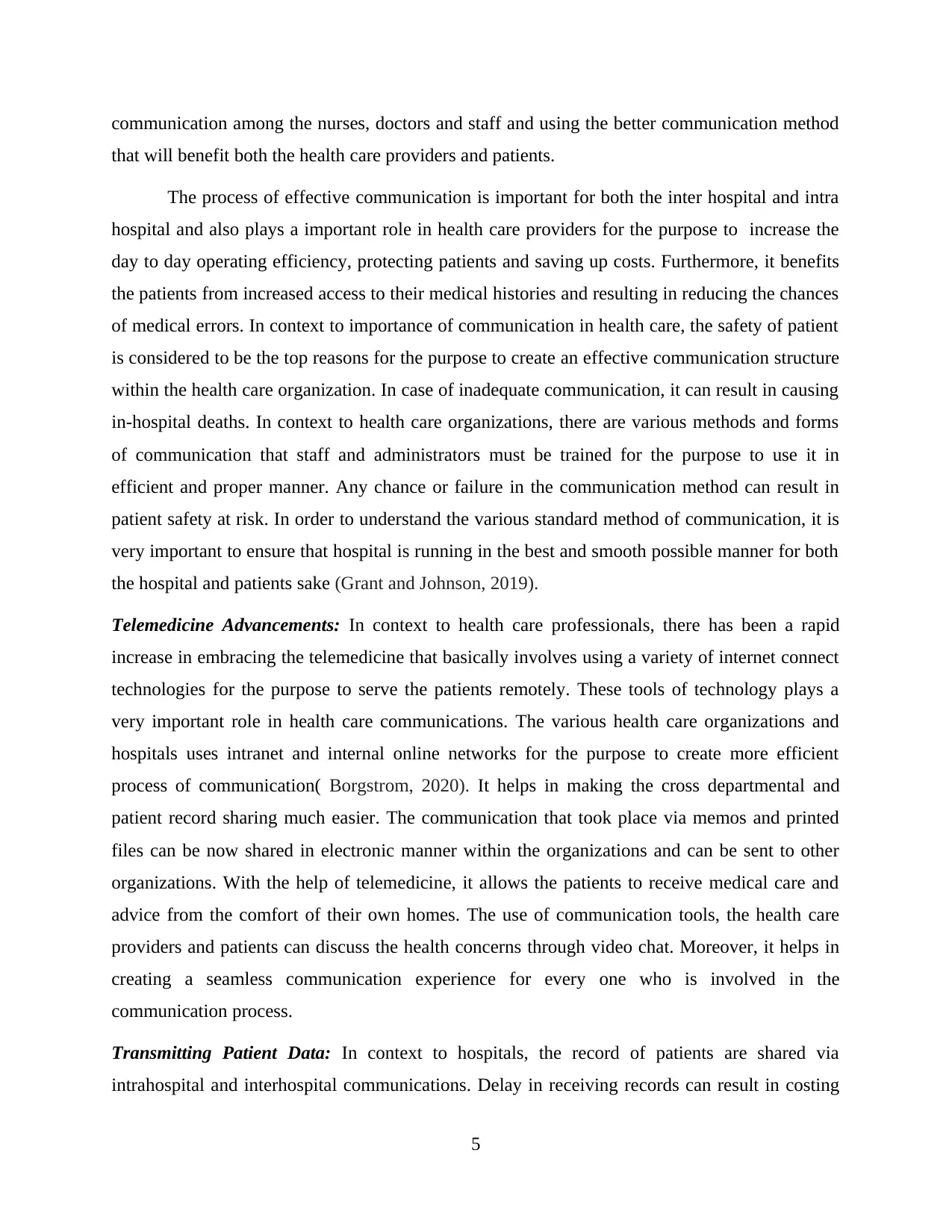
communication among the nurses, doctors and staff and using the better communication method
that will benefit both the health care providers and patients.
The process of effective communication is important for both the inter hospital and intra
hospital and also plays a important role in health care providers for the purpose to increase the
day to day operating efficiency, protecting patients and saving up costs. Furthermore, it benefits
the patients from increased access to their medical histories and resulting in reducing the chances
of medical errors. In context to importance of communication in health care, the safety of patient
is considered to be the top reasons for the purpose to create an effective communication structure
within the health care organization. In case of inadequate communication, it can result in causing
in-hospital deaths. In context to health care organizations, there are various methods and forms
of communication that staff and administrators must be trained for the purpose to use it in
efficient and proper manner. Any chance or failure in the communication method can result in
patient safety at risk. In order to understand the various standard method of communication, it is
very important to ensure that hospital is running in the best and smooth possible manner for both
the hospital and patients sake (Grant and Johnson, 2019).
Telemedicine Advancements: In context to health care professionals, there has been a rapid
increase in embracing the telemedicine that basically involves using a variety of internet connect
technologies for the purpose to serve the patients remotely. These tools of technology plays a
very important role in health care communications. The various health care organizations and
hospitals uses intranet and internal online networks for the purpose to create more efficient
process of communication( Borgstrom, 2020). It helps in making the cross departmental and
patient record sharing much easier. The communication that took place via memos and printed
files can be now shared in electronic manner within the organizations and can be sent to other
organizations. With the help of telemedicine, it allows the patients to receive medical care and
advice from the comfort of their own homes. The use of communication tools, the health care
providers and patients can discuss the health concerns through video chat. Moreover, it helps in
creating a seamless communication experience for every one who is involved in the
communication process.
Transmitting Patient Data: In context to hospitals, the record of patients are shared via
intrahospital and interhospital communications. Delay in receiving records can result in costing
5
that will benefit both the health care providers and patients.
The process of effective communication is important for both the inter hospital and intra
hospital and also plays a important role in health care providers for the purpose to increase the
day to day operating efficiency, protecting patients and saving up costs. Furthermore, it benefits
the patients from increased access to their medical histories and resulting in reducing the chances
of medical errors. In context to importance of communication in health care, the safety of patient
is considered to be the top reasons for the purpose to create an effective communication structure
within the health care organization. In case of inadequate communication, it can result in causing
in-hospital deaths. In context to health care organizations, there are various methods and forms
of communication that staff and administrators must be trained for the purpose to use it in
efficient and proper manner. Any chance or failure in the communication method can result in
patient safety at risk. In order to understand the various standard method of communication, it is
very important to ensure that hospital is running in the best and smooth possible manner for both
the hospital and patients sake (Grant and Johnson, 2019).
Telemedicine Advancements: In context to health care professionals, there has been a rapid
increase in embracing the telemedicine that basically involves using a variety of internet connect
technologies for the purpose to serve the patients remotely. These tools of technology plays a
very important role in health care communications. The various health care organizations and
hospitals uses intranet and internal online networks for the purpose to create more efficient
process of communication( Borgstrom, 2020). It helps in making the cross departmental and
patient record sharing much easier. The communication that took place via memos and printed
files can be now shared in electronic manner within the organizations and can be sent to other
organizations. With the help of telemedicine, it allows the patients to receive medical care and
advice from the comfort of their own homes. The use of communication tools, the health care
providers and patients can discuss the health concerns through video chat. Moreover, it helps in
creating a seamless communication experience for every one who is involved in the
communication process.
Transmitting Patient Data: In context to hospitals, the record of patients are shared via
intrahospital and interhospital communications. Delay in receiving records can result in costing
5
Paraphrase This Document
Need a fresh take? Get an instant paraphrase of this document with our AI Paraphraser
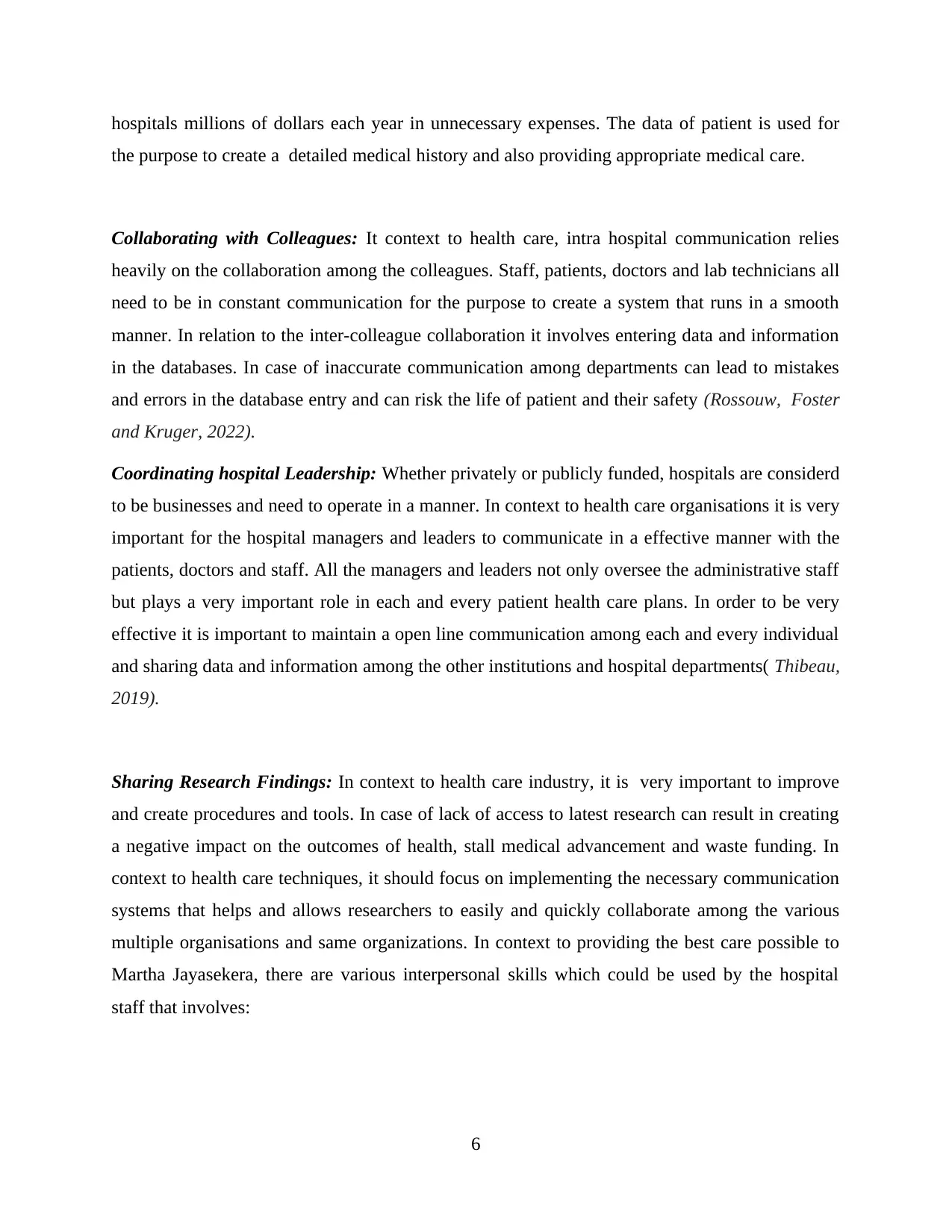
hospitals millions of dollars each year in unnecessary expenses. The data of patient is used for
the purpose to create a detailed medical history and also providing appropriate medical care.
Collaborating with Colleagues: It context to health care, intra hospital communication relies
heavily on the collaboration among the colleagues. Staff, patients, doctors and lab technicians all
need to be in constant communication for the purpose to create a system that runs in a smooth
manner. In relation to the inter-colleague collaboration it involves entering data and information
in the databases. In case of inaccurate communication among departments can lead to mistakes
and errors in the database entry and can risk the life of patient and their safety (Rossouw, Foster
and Kruger, 2022).
Coordinating hospital Leadership: Whether privately or publicly funded, hospitals are considerd
to be businesses and need to operate in a manner. In context to health care organisations it is very
important for the hospital managers and leaders to communicate in a effective manner with the
patients, doctors and staff. All the managers and leaders not only oversee the administrative staff
but plays a very important role in each and every patient health care plans. In order to be very
effective it is important to maintain a open line communication among each and every individual
and sharing data and information among the other institutions and hospital departments( Thibeau,
2019).
Sharing Research Findings: In context to health care industry, it is very important to improve
and create procedures and tools. In case of lack of access to latest research can result in creating
a negative impact on the outcomes of health, stall medical advancement and waste funding. In
context to health care techniques, it should focus on implementing the necessary communication
systems that helps and allows researchers to easily and quickly collaborate among the various
multiple organisations and same organizations. In context to providing the best care possible to
Martha Jayasekera, there are various interpersonal skills which could be used by the hospital
staff that involves:
6
the purpose to create a detailed medical history and also providing appropriate medical care.
Collaborating with Colleagues: It context to health care, intra hospital communication relies
heavily on the collaboration among the colleagues. Staff, patients, doctors and lab technicians all
need to be in constant communication for the purpose to create a system that runs in a smooth
manner. In relation to the inter-colleague collaboration it involves entering data and information
in the databases. In case of inaccurate communication among departments can lead to mistakes
and errors in the database entry and can risk the life of patient and their safety (Rossouw, Foster
and Kruger, 2022).
Coordinating hospital Leadership: Whether privately or publicly funded, hospitals are considerd
to be businesses and need to operate in a manner. In context to health care organisations it is very
important for the hospital managers and leaders to communicate in a effective manner with the
patients, doctors and staff. All the managers and leaders not only oversee the administrative staff
but plays a very important role in each and every patient health care plans. In order to be very
effective it is important to maintain a open line communication among each and every individual
and sharing data and information among the other institutions and hospital departments( Thibeau,
2019).
Sharing Research Findings: In context to health care industry, it is very important to improve
and create procedures and tools. In case of lack of access to latest research can result in creating
a negative impact on the outcomes of health, stall medical advancement and waste funding. In
context to health care techniques, it should focus on implementing the necessary communication
systems that helps and allows researchers to easily and quickly collaborate among the various
multiple organisations and same organizations. In context to providing the best care possible to
Martha Jayasekera, there are various interpersonal skills which could be used by the hospital
staff that involves:
6
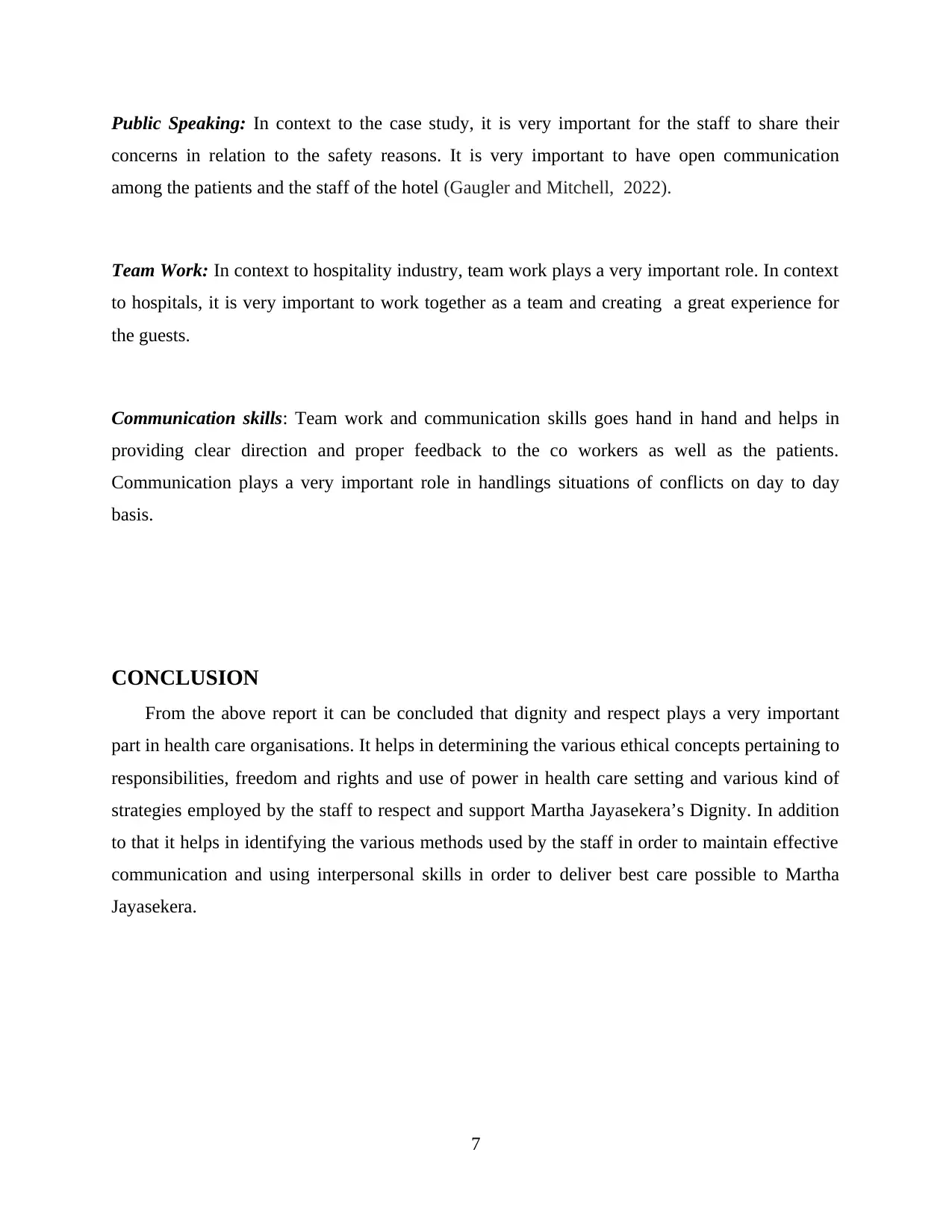
Public Speaking: In context to the case study, it is very important for the staff to share their
concerns in relation to the safety reasons. It is very important to have open communication
among the patients and the staff of the hotel (Gaugler and Mitchell, 2022).
Team Work: In context to hospitality industry, team work plays a very important role. In context
to hospitals, it is very important to work together as a team and creating a great experience for
the guests.
Communication skills: Team work and communication skills goes hand in hand and helps in
providing clear direction and proper feedback to the co workers as well as the patients.
Communication plays a very important role in handlings situations of conflicts on day to day
basis.
CONCLUSION
From the above report it can be concluded that dignity and respect plays a very important
part in health care organisations. It helps in determining the various ethical concepts pertaining to
responsibilities, freedom and rights and use of power in health care setting and various kind of
strategies employed by the staff to respect and support Martha Jayasekera’s Dignity. In addition
to that it helps in identifying the various methods used by the staff in order to maintain effective
communication and using interpersonal skills in order to deliver best care possible to Martha
Jayasekera.
7
concerns in relation to the safety reasons. It is very important to have open communication
among the patients and the staff of the hotel (Gaugler and Mitchell, 2022).
Team Work: In context to hospitality industry, team work plays a very important role. In context
to hospitals, it is very important to work together as a team and creating a great experience for
the guests.
Communication skills: Team work and communication skills goes hand in hand and helps in
providing clear direction and proper feedback to the co workers as well as the patients.
Communication plays a very important role in handlings situations of conflicts on day to day
basis.
CONCLUSION
From the above report it can be concluded that dignity and respect plays a very important
part in health care organisations. It helps in determining the various ethical concepts pertaining to
responsibilities, freedom and rights and use of power in health care setting and various kind of
strategies employed by the staff to respect and support Martha Jayasekera’s Dignity. In addition
to that it helps in identifying the various methods used by the staff in order to maintain effective
communication and using interpersonal skills in order to deliver best care possible to Martha
Jayasekera.
7
⊘ This is a preview!⊘
Do you want full access?
Subscribe today to unlock all pages.

Trusted by 1+ million students worldwide
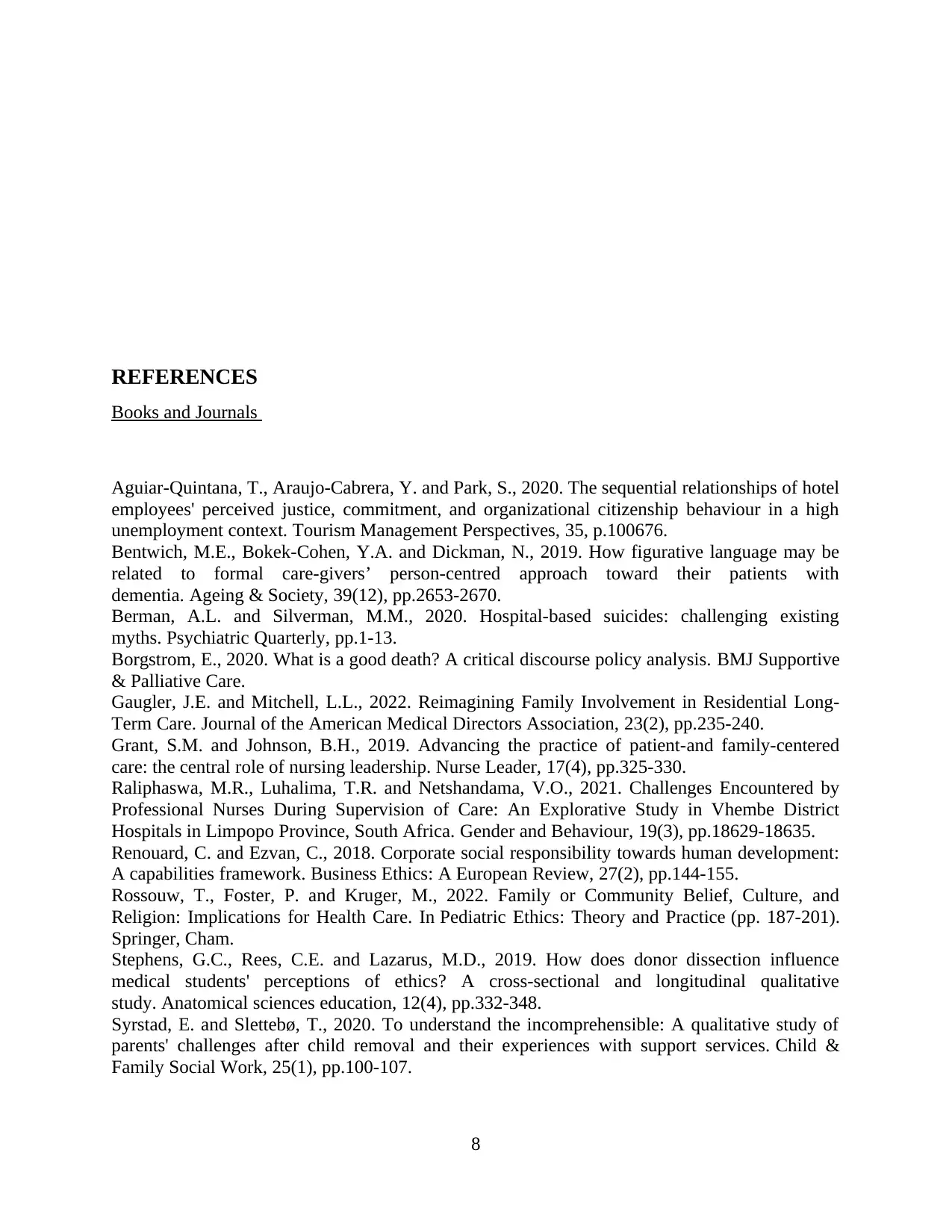
REFERENCES
Books and Journals
Aguiar-Quintana, T., Araujo-Cabrera, Y. and Park, S., 2020. The sequential relationships of hotel
employees' perceived justice, commitment, and organizational citizenship behaviour in a high
unemployment context. Tourism Management Perspectives, 35, p.100676.
Bentwich, M.E., Bokek-Cohen, Y.A. and Dickman, N., 2019. How figurative language may be
related to formal care-givers’ person-centred approach toward their patients with
dementia. Ageing & Society, 39(12), pp.2653-2670.
Berman, A.L. and Silverman, M.M., 2020. Hospital-based suicides: challenging existing
myths. Psychiatric Quarterly, pp.1-13.
Borgstrom, E., 2020. What is a good death? A critical discourse policy analysis. BMJ Supportive
& Palliative Care.
Gaugler, J.E. and Mitchell, L.L., 2022. Reimagining Family Involvement in Residential Long-
Term Care. Journal of the American Medical Directors Association, 23(2), pp.235-240.
Grant, S.M. and Johnson, B.H., 2019. Advancing the practice of patient-and family-centered
care: the central role of nursing leadership. Nurse Leader, 17(4), pp.325-330.
Raliphaswa, M.R., Luhalima, T.R. and Netshandama, V.O., 2021. Challenges Encountered by
Professional Nurses During Supervision of Care: An Explorative Study in Vhembe District
Hospitals in Limpopo Province, South Africa. Gender and Behaviour, 19(3), pp.18629-18635.
Renouard, C. and Ezvan, C., 2018. Corporate social responsibility towards human development:
A capabilities framework. Business Ethics: A European Review, 27(2), pp.144-155.
Rossouw, T., Foster, P. and Kruger, M., 2022. Family or Community Belief, Culture, and
Religion: Implications for Health Care. In Pediatric Ethics: Theory and Practice (pp. 187-201).
Springer, Cham.
Stephens, G.C., Rees, C.E. and Lazarus, M.D., 2019. How does donor dissection influence
medical students' perceptions of ethics? A cross‐sectional and longitudinal qualitative
study. Anatomical sciences education, 12(4), pp.332-348.
Syrstad, E. and Slettebø, T., 2020. To understand the incomprehensible: A qualitative study of
parents' challenges after child removal and their experiences with support services. Child &
Family Social Work, 25(1), pp.100-107.
8
Books and Journals
Aguiar-Quintana, T., Araujo-Cabrera, Y. and Park, S., 2020. The sequential relationships of hotel
employees' perceived justice, commitment, and organizational citizenship behaviour in a high
unemployment context. Tourism Management Perspectives, 35, p.100676.
Bentwich, M.E., Bokek-Cohen, Y.A. and Dickman, N., 2019. How figurative language may be
related to formal care-givers’ person-centred approach toward their patients with
dementia. Ageing & Society, 39(12), pp.2653-2670.
Berman, A.L. and Silverman, M.M., 2020. Hospital-based suicides: challenging existing
myths. Psychiatric Quarterly, pp.1-13.
Borgstrom, E., 2020. What is a good death? A critical discourse policy analysis. BMJ Supportive
& Palliative Care.
Gaugler, J.E. and Mitchell, L.L., 2022. Reimagining Family Involvement in Residential Long-
Term Care. Journal of the American Medical Directors Association, 23(2), pp.235-240.
Grant, S.M. and Johnson, B.H., 2019. Advancing the practice of patient-and family-centered
care: the central role of nursing leadership. Nurse Leader, 17(4), pp.325-330.
Raliphaswa, M.R., Luhalima, T.R. and Netshandama, V.O., 2021. Challenges Encountered by
Professional Nurses During Supervision of Care: An Explorative Study in Vhembe District
Hospitals in Limpopo Province, South Africa. Gender and Behaviour, 19(3), pp.18629-18635.
Renouard, C. and Ezvan, C., 2018. Corporate social responsibility towards human development:
A capabilities framework. Business Ethics: A European Review, 27(2), pp.144-155.
Rossouw, T., Foster, P. and Kruger, M., 2022. Family or Community Belief, Culture, and
Religion: Implications for Health Care. In Pediatric Ethics: Theory and Practice (pp. 187-201).
Springer, Cham.
Stephens, G.C., Rees, C.E. and Lazarus, M.D., 2019. How does donor dissection influence
medical students' perceptions of ethics? A cross‐sectional and longitudinal qualitative
study. Anatomical sciences education, 12(4), pp.332-348.
Syrstad, E. and Slettebø, T., 2020. To understand the incomprehensible: A qualitative study of
parents' challenges after child removal and their experiences with support services. Child &
Family Social Work, 25(1), pp.100-107.
8
Paraphrase This Document
Need a fresh take? Get an instant paraphrase of this document with our AI Paraphraser
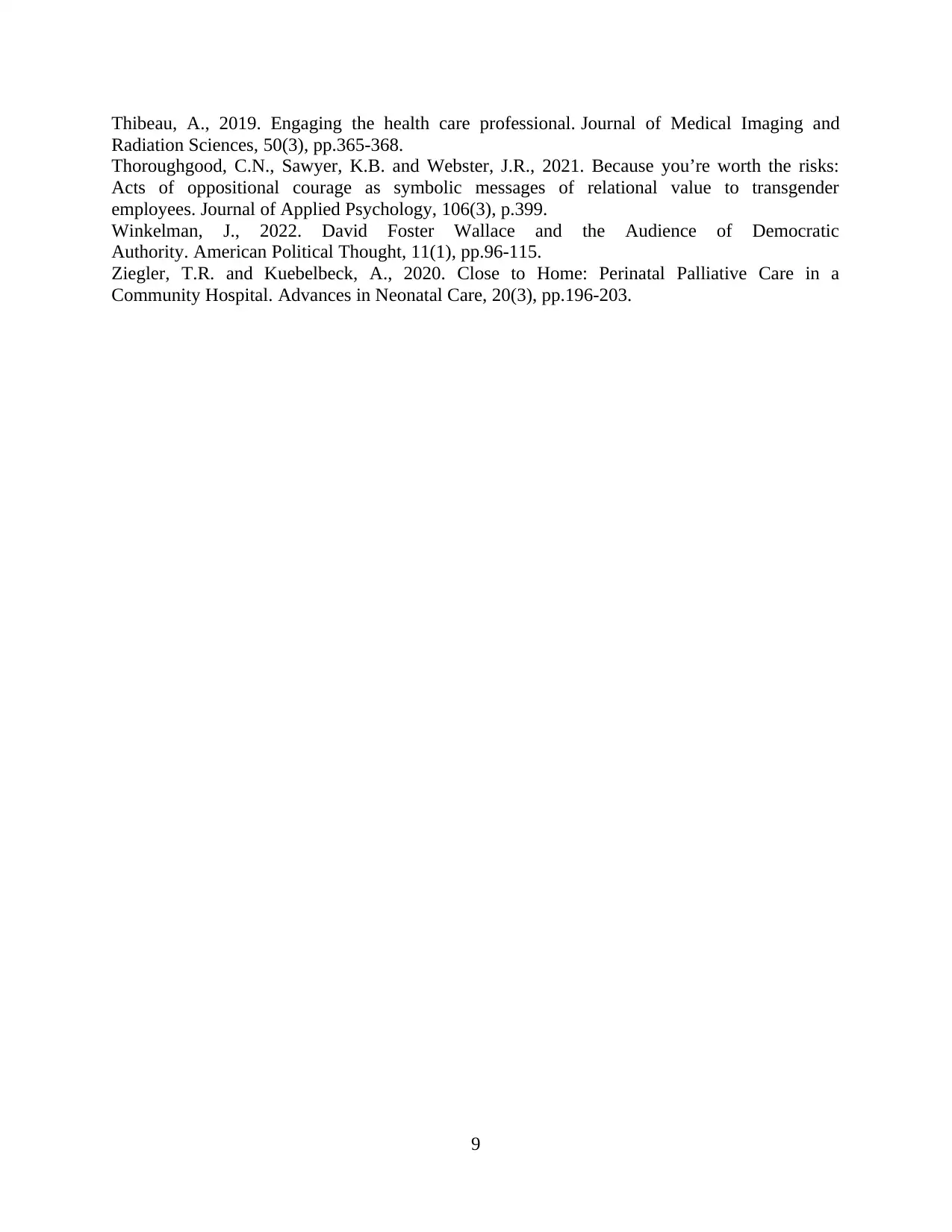
Thibeau, A., 2019. Engaging the health care professional. Journal of Medical Imaging and
Radiation Sciences, 50(3), pp.365-368.
Thoroughgood, C.N., Sawyer, K.B. and Webster, J.R., 2021. Because you’re worth the risks:
Acts of oppositional courage as symbolic messages of relational value to transgender
employees. Journal of Applied Psychology, 106(3), p.399.
Winkelman, J., 2022. David Foster Wallace and the Audience of Democratic
Authority. American Political Thought, 11(1), pp.96-115.
Ziegler, T.R. and Kuebelbeck, A., 2020. Close to Home: Perinatal Palliative Care in a
Community Hospital. Advances in Neonatal Care, 20(3), pp.196-203.
9
Radiation Sciences, 50(3), pp.365-368.
Thoroughgood, C.N., Sawyer, K.B. and Webster, J.R., 2021. Because you’re worth the risks:
Acts of oppositional courage as symbolic messages of relational value to transgender
employees. Journal of Applied Psychology, 106(3), p.399.
Winkelman, J., 2022. David Foster Wallace and the Audience of Democratic
Authority. American Political Thought, 11(1), pp.96-115.
Ziegler, T.R. and Kuebelbeck, A., 2020. Close to Home: Perinatal Palliative Care in a
Community Hospital. Advances in Neonatal Care, 20(3), pp.196-203.
9

10
⊘ This is a preview!⊘
Do you want full access?
Subscribe today to unlock all pages.

Trusted by 1+ million students worldwide
1 out of 12
Related Documents
Your All-in-One AI-Powered Toolkit for Academic Success.
+13062052269
info@desklib.com
Available 24*7 on WhatsApp / Email
![[object Object]](/_next/static/media/star-bottom.7253800d.svg)
Unlock your academic potential
Copyright © 2020–2026 A2Z Services. All Rights Reserved. Developed and managed by ZUCOL.

